How to Make Homemade Almond Butter (1 Ingredient ONLY!)

Homemade Almond Butter is a spreadable butter made from dried fruit that is widely used in the kitchen in many sweet and savory preparations. It is made without added sugar or fat, with just one ingredient: peeled almonds, toasted in the oven for a few minutes and then blended in a mixer until you get a soft and velvety mixture.
What is Almond Butter?
Almond butter is a smooth, spreadable paste made from roasted almonds. Its origins can be traced back to ancient civilizations, where almonds were prized for their nutritional value. While its modern popularity soared in the U.S. as a healthier alternative to peanut butter, almond butter has deep roots in Mediterranean cuisine. It is rich in healthy fats, proteins, and antioxidants, making it a nutritious addition to various dishes, from desserts to savory meals.
Pro Tips for The Best Almond Butter
- To blend the almonds more easily, you can blanch them for a few minutes in boiling water before proceeding with toasting them in the oven.
- Blend the almonds, intermittently and with a cutter with powerful blades, taking care not to overheat them: in this way the dried fruit will first transform into grains, then into a flour that will start to naturally release oils and, finally, into a smooth and silky cream.
- If you don't have a good food processor at home, our suggestion is to add a couple of teaspoons of seed oil (rice, corn, peanut or sunflower) to the blender jug: this way, you will obtain, without any effort, a creamy butter without lumps.
Is It Worth to Make Your Own Almond Butter?
Making your own homemade almond butter is definitely worth it if you're looking for a fresh, customizable, and preservative-free option. By preparing it at home, you can control the ingredients, ensuring there are no added sugars, oils, or preservatives. Plus, homemade almond butter often has a richer flavor and smoother texture compared to store-bought versions. It's also more cost-effective, especially if you buy almonds in bulk.
What's Better: A Blender or a Food Processor?
A food processor is generally better for making almond butter. It can handle the thick consistency and is designed for grinding and pureeing nuts more efficiently. The blades in a food processor are typically stronger and can break down almonds into a smooth butter. A blender, on the other hand, might struggle with the thickness and can overheat, making the process longer.
What Can I Use Almond Butter For?
Almond butter is incredibly versatile! You can spread it on toast, pancakes, or waffles, or use it as a dip for fruits like apples and bananas. It’s also great in smoothies, oatmeal, or as a baking ingredient in cookies and cakes. You can even add it to savory dishes, such as stir-fries or salad dressings, for a rich, nutty flavor.
Is This Recipe Vegan?
Yes, almond butter is vegan! It’s made purely from almonds, with no animal-derived ingredients. As long as it doesn't contain added honey or dairy-based additives, almond butter is a great plant-based option for vegans.
Why Won't My Almonds Turn to Butter?
If your almonds aren't turning into butter, it's likely due to a few common issues. First, you may not be processing them long enough — almond butter needs time to break down fully. Also, the almonds might be too dry or not roasted enough, which can make them harder to turn into butter.
Can I Add Anything Else to Almond Butter?
For a super delicious variation, you can enrich the cream with a little icing sugar and a pinch of cinnamon, or with melted chocolate, white or dark, and a teaspoon of vanilla extract.
Can I Make This Almond Butter Ahead of Time?
Yes, almond butter can definitely be made ahead of time! It stores well in an airtight container at room temperature for about a week, or in the fridge for up to a month. Making it in advance can save you time, and it keeps its rich flavor and smooth texture for quite a while. Just give it a quick stir before using, as it may separate slightly over time.
Does Almond Butter Freeze Well?
Yes, almond butter freezes well! You can store it in an airtight container or freezer-safe jar for up to 3 months. To use, simply thaw it in the fridge overnight. Freezing helps preserve its freshness, and it maintains its smooth texture once thawed, making it a great option for long-term storage.
How to Store Homemade Almond Butter
The almond cream can be stored in the fridge, in an airtight jar, for a maximum of 2 weeks.
Ingredients
How to Make Homemade Almond Butter
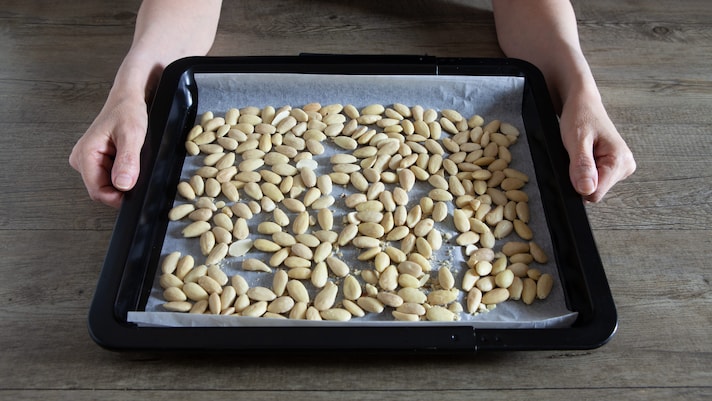
Spread the peeled almonds on a baking tray with parchment paper and let them toast to 360°F/180°C for about 6 minutes, or until golden. If they are already toasted, heat them in the oven at 122°F/50°C for 5 minutes.
Spread the peeled almonds on a baking tray with parchment paper and let them toast to 360°F/180°C for about 6 minutes, or until golden. If they are already toasted, heat them in the oven at 122°F/50°C for 5 minutes.
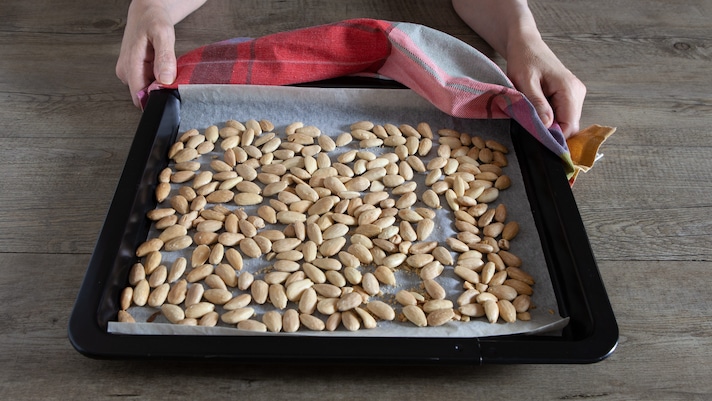
Once the time has passed, take the almonds out of the oven.
Once the time has passed, take the almonds out of the oven.
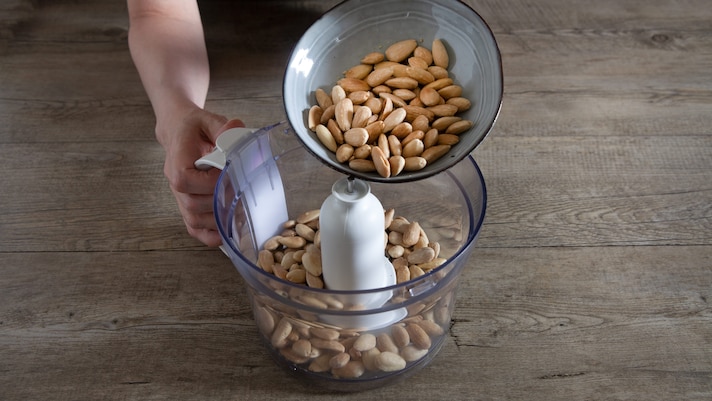
Pour them still hot into the jug of a food processor.
Pour them still hot into the jug of a food processor.
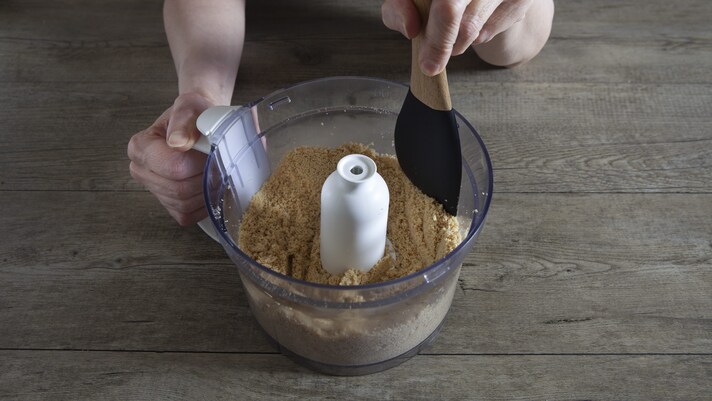
Grind the almonds for about 30 seconds, then pause for 20-30 seconds and continue blending intermittently until you obtain a fine grain.
Grind the almonds for about 30 seconds, then pause for 20-30 seconds and continue blending intermittently until you obtain a fine grain.
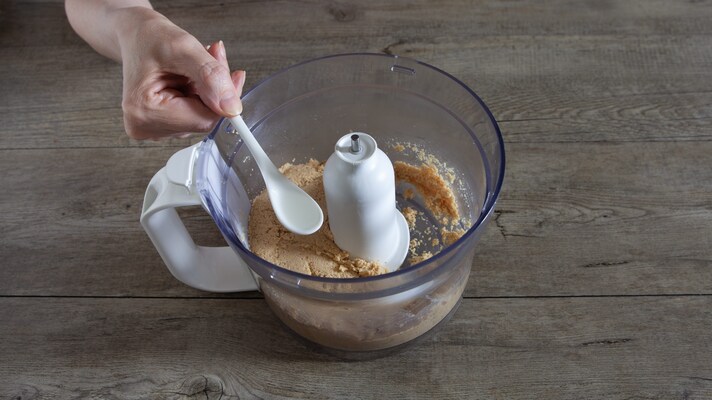
Continue blending with short pulses until the cream is fluid and smooth: it will take about 20 minutes, including breaks.
Continue blending with short pulses until the cream is fluid and smooth: it will take about 20 minutes, including breaks.
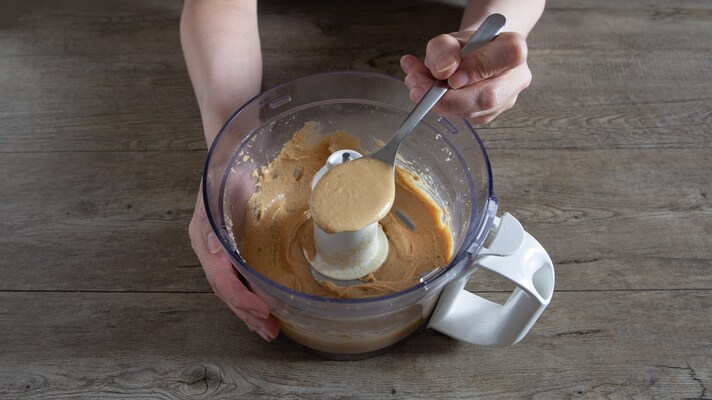
Once it reaches this consistency, it'll be ready.
Once it reaches this consistency, it'll be ready.
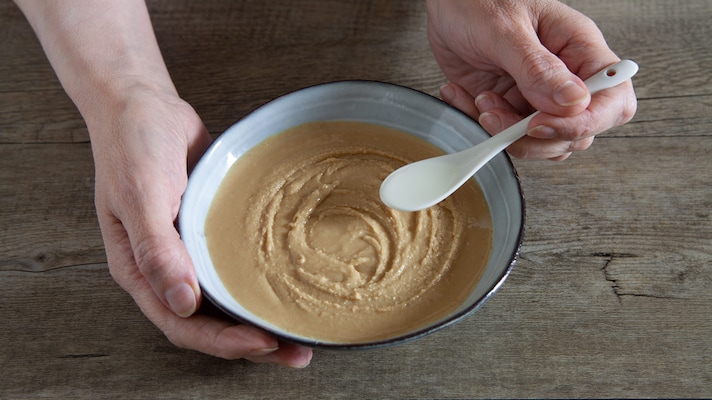
Transfer it to a container, and, if you want a more fluid butter, you can add a teaspoon of seed oil.
Transfer it to a container, and, if you want a more fluid butter, you can add a teaspoon of seed oil.
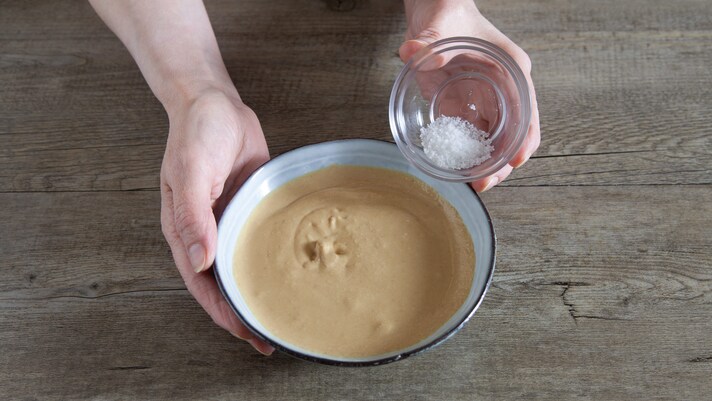
Instead, for a savory version, you can add a pinch of salt.
Instead, for a savory version, you can add a pinch of salt.
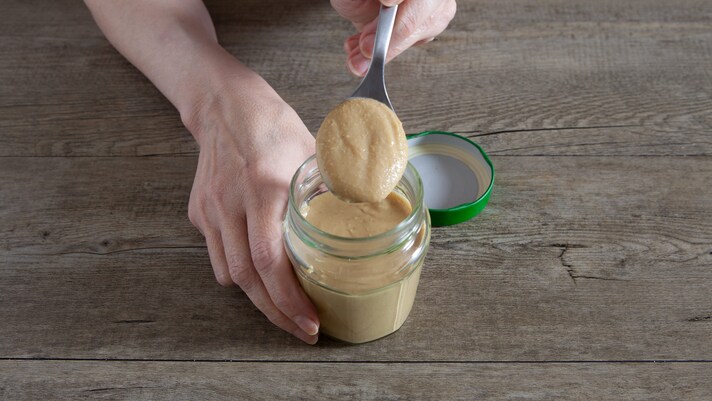
Transfer the cream into a sterilized glass jar.
Transfer the cream into a sterilized glass jar.

Enjoy!
Enjoy!
;Resize,width=767;)



